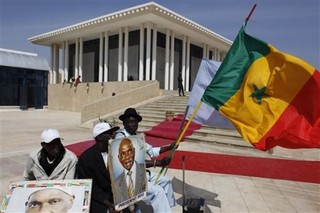These times we live in have been called a lot of things. But perhaps the most surprising description came Sunday from one of the country's leading religion scholars.
"The most exciting time in Christianity ... since the 1st century."
Yes, even more thrilling than the Protestant Reformation, Philip Jenkins told about 75 people at Charlotte's Westminster Presbyterian Church.
The reason: The staggering growth in the number of Christians in Asia, Latin America and especially Africa - a phenomenon he called "a global religious revolution" and one that "reverses a trend that people had been used to for several hundred years."
To back up his claim, Jenkins - the author of a host of influential books, including "The Next Christendom: The Rise of Global Christianity" - offered a series of eye-popping statistics and projections.
Among them:
In 1900, Europe and North America accounted for about 85 percent of the world's Christians. By 2050, that number will have shrunk to about 25 percent.
During the same period, he said the number of Christians in Africa have, well, skyrocketed seems too tame a word. In 1900, there were 10 million; in 2000, 363 million. By 2015, Jenkins expects 500 million. And, by 2050, he predicted that Africa would become the first continent to have 1 billion Christians. Put another way: One of every three Christians in the world will be African - and that's not counting the Africans who will have moved to the United States or Europe.
In the 20th century, about half of the people on the African continent moved from a tribal or pagan religion to either Christianity or Islam. And, Jenkins added, "Christians outpaced Muslims considerably" - by a margin of about 4 to 1.
The Welsh-born Jenkins, a professor at Penn State and Baylor whose books are lauded by both conservative evangelicals and liberal scholars, was brought to town by Union Presbyterian Seminary at Charlotte.
He'll speak again at 10 a.m. today, to a group of Charlotte area pastors.
On Sunday, he told his audience that, right now, the three most Christian regions in the world are Europe, Latin America and Africa - in that order.
But by 2025, as Europe continues down the road of secularism, "Africa and Latin America will be jostling each other for (that) title," Jenkins said. "By 2050, no doubt, Africa wins."
Though the United States will continue to be a religious - and predominantly Christian country - it will be immigrants and the children and grandchildren of immigrants who help it stay that way, Jenkins said.
According to some projections, Jenkins said, the Roman Catholic Church in the United States could be as much as 80 percent Latino by 2050.
Speaking of Catholicism, Jenkins predicted that it won't be long before there's an African-born pope - and perhaps a series of them. Currently, he said, 70 percent of the world's Catholics live in Africa, Asia and Latin America.
"Christianity was born in Asia and Africa," Jenkins said, "and in our lifetimes, it has decided to go home." But why? And why now?
Part of the answer has to do with demography - population growth, birth rates.
In 1900, Jenkins said, Europeans outnumbered Africans 3-1. But by 2050, he said, there will be three Africans for every European.
Meanwhile, in Europe, population is stagnant. In Italy, the median age is 40, Jenkins said. In Uganda, it's 14.
And any growth in the ranks of the religious in Europe - the continent that was the capital of Christianity for millennia - tends to come from migrants: Muslims from Turkey or Pakistan and Christians from Africa or the Caribbean.
Conversions a key to change
Jenkins also pointed to conversions as a major reason for the tidal wave. In the 20th century, Africa - long a continent of European colonies, with missionaries running schools, medical clinics and churches - went from 10 percent Christian to 46 percent Christian.
For many Africans, Jenkins said, the appeal of Christianity is that the Bible, written many hundreds of years ago, often reads like it was written about and for their societies today, where poverty is common, and many never make it to old age.
"Preaching in Africa, when you talk about idols, you mean it" literally, Jenkins said.
Africa can relate to Bible
In the West, faith healers are largely discredited. Not so in the Third World, Jenkins said, where Christianity is often seen as a religion to heal the mind, the body, the soul - and the society.
And, Jenkins said, many African theologians are astounded at how the Bible's imagery often mirrors those in Africa - including the mention of blood sacrifices to atone for sins.
"For many Africans, if they don't do sacrifices, their parents did," Jenkins said.
African Christianity also tends to be Pentecostal in worship style and both liberal and conservative - depending on the subject. "On social and political issues - the idea of what the state should be doing - it's often far to the left of the Democratic Party," Jenkins said. "But on moral and sexual issues, it can be very conservative."
Read Full Article »



